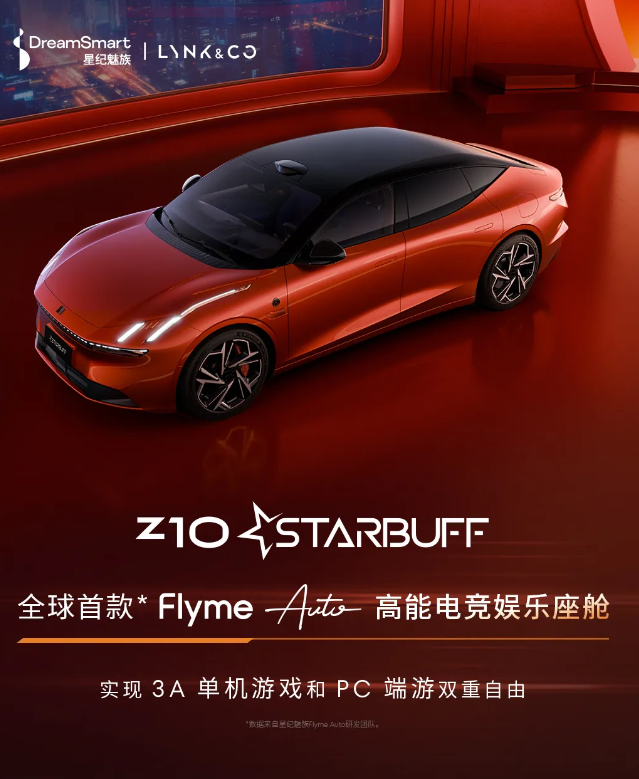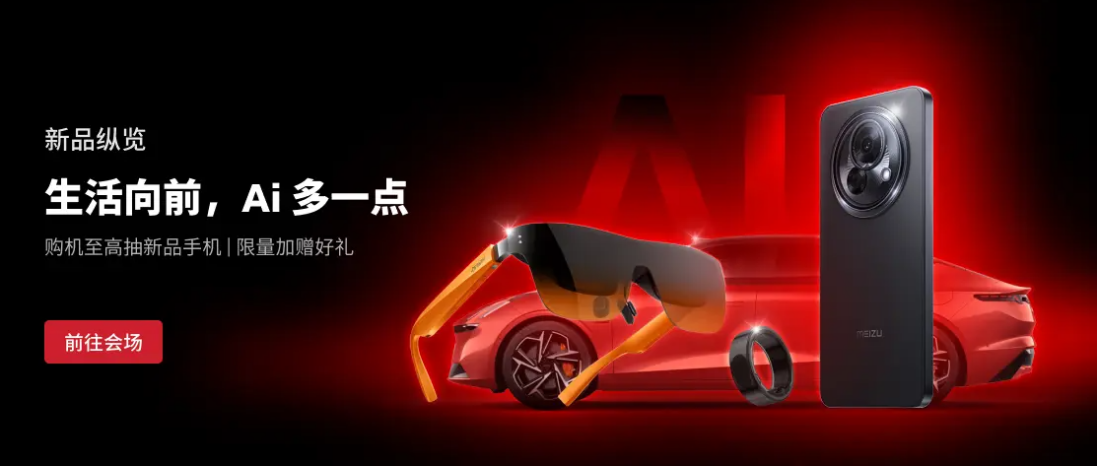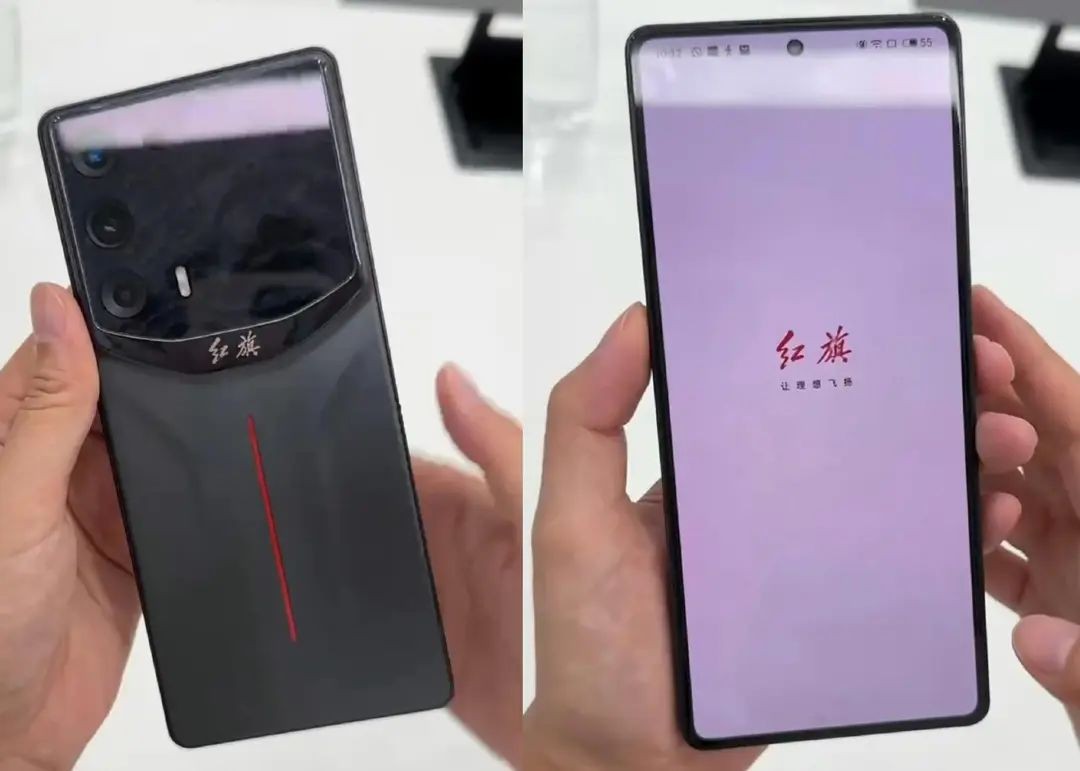"AI + car" double buff, can Starryme make a comeback with full strength?
![]() 10/08 2024
10/08 2024
![]() 572
572
Mobile phones and cars will eventually converge in the era of AI, but after a whole National Day holiday, Meizu's "new tricks" seem to have failed to generate enough buzz.
At the end of last month, Starryme unveiled multiple electronic products at its AI Ecosystem Conference, including AI smartphones, AR smart glasses, smart rings, and the Z10 STARBUFF e-sports custom edition car jointly created with Lynk & Co.

Starryme CEO Su Jing said that one of Starryme's advantages is its focus on developing its core products and experiences. It aims to build an ecosystem centered around Flyme AIOS, with smartphones, smart glasses, and smart cars developing together.
Therefore, the core products are four products that represent the mainstream market of the future: smartphones, smart glasses, cars, and robots; the core experience is the integration of AI ecosystems across devices, achieving full hardware and software integration.
Since announcing "All in AI" in February this year, Starryme has consistently focused on the "AI Ecosystem" layout rather than just individual product AI capabilities. This story is not entirely new, but since Starryme is in charge, the automotive and mobile phone industries should have attracted more attention. With the catalysis of the times, another player has entered the "human + car + device" interconnected smart ecosystem.
Meizu and its AI "new tricks"
Starryme's current most talked-about topic is its potential in the automotive sector. Of course, as a manufacturer that has undergone complex restructuring, unlike Huawei and Xiaomi, which started their upward breakthrough from within, Starryme's smart car journey relies more on external drivers.
Founded in 2003, Meizu is a veteran in the domestic mobile phone industry. Its journey over the past 20 years has had its highs and lows, but strategic missteps have caused Meizu to miss many opportunities.
It was not until Meizu was selected by Geely in 2022 that new expectations emerged. In July 2022, Meizu was officially acquired by Geely Group; by the end of November 2023, it officially announced its entry into the automotive market. Starryme is now its full incarnation.

Although relying on Geely can shorten Starryme's vehicle development cycle and reduce R&D costs, cross-industry carmaking is not straightforward. Significant investment costs, brand recognition, and other factors are critical considerations for automotive projects.
Starryme is well aware of this, as COO Liao Qinghong stated, "We're not aiming for the stars but hoping to win over some customers through lightweight investments and win-win cooperation."
Currently, Starryme's "car-phone plan" can be broadly divided into two parts. The first is following Xiaomi's path by directly manufacturing cars independently.
When it announced its entry into the automotive market late last year, Meizu planned to launch its first car, the MEIZU DreamCar MX, in Q1 2024, initiating the DreamCar co-creation program. In January this year, Meizu DreamCar MX launched a car enthusiasts' exchange platform.
At this conference, Starryme partnered with Lynk & Co to introduce the first e-sports custom car, the Z10 STARBUFF, targeting a niche market segment and setting a certain highlight for itself. However, based on the past two weeks' buzz, this product's main selling points clearly lack the ability to break through the circle. While the e-sports edition has attracted some attention, it still needs to withstand consumers' overall assessment of the car's overall configuration.
However, considering this is an innovative experience, Meizu may still have more innovative cards up its sleeve. The current trial run will help it explore richer product lines in the future, catering to audience needs.
The second, and currently more feasible approach, is adopting a "Huawei model" similar to Hongmeng Zhixing, entering the market with software technology ecosystems.
However, unlike Hongmeng Zhixing's emphasis on intelligent driving technologies, Starryme's focus is on "car-phone interconnection." It has proposed the concept of the "sixth domain" beyond the traditional five domains of automobiles (powertrain, chassis, body, cabin, and autonomous driving), namely the "phone domain."
Meizu aims to use phones as a bridge, leveraging AI to harness the underlying capabilities of its Flyme AIOS smart system, thereby integrating the Flyme Auto intelligent in-vehicle system and making phones a true part of cars.
Drawing on its extensive experience and technological accumulation in mobile phone manufacturing, Starryme's Flyme Auto has delivered impressive results. To date, in addition to Geely-affiliated brands like Lynk & Co, Geely Auto, and Polestar, Hongqi models 07 and 09 also use the Flyme Auto AIOS system.
With the prevalence of the "phone domain" concept, Starryme's "car-phone interconnection" has also influenced the development of its mobile phone business. Recently, it was revealed that Hongqi's first mobile phone is being manufactured by Meizu.

(Image source: Internet)
It should be noted that this phone is a collaborative development between Hongqi Automobile and Ecarx, a leading provider of smart cockpit solutions in China. Clearly, similar to Geely and NIO's forays into mobile phones, Hongqi's entry is not about making a splash in the mobile phone market but rather seizing the opportunity of intelligent transformation to expand its integrated ecosystem.
As Li Shufu, Chairman of Geely Automobile, once bluntly stated, making mobile phones is about building an ecosystem, realizing car-phone integration, enhancing software capabilities, and making smart cars more competitive.
"Intelligent driving" on mobile phones
In today's converging industry landscape, it's no longer unusual for mobile phone brands to make cars or automakers to make phones. Driven by factors such as the accelerated iteration of AI technologies and the implementation of digital and intelligent business scenarios, the "interconnected ecosystem" has become an explicit area of competition.
In the automotive sector, 2024 marks the beginning of the next stage centered around deep intelligence, a consensus across the entire industry. However, the shift in industry hotspots and priorities is evident. While NIO, Xpeng, and traditional automakers used to dominate discussions, technology leaders like Huawei and Xiaomi are now garnering more attention.
This is partly due to the products and marketing paths of both sides and partly because the consumerization of automotive electronics has empowered consumers with more knowledge and influence. As supply chains become more transparent, interconnected ecosystems emerge, new energy vehicle configurations evolve, and marketing domains expand, consumers are becoming more specialized and closely observe manufacturers' every move. To gain consumer recognition, companies must make their ecosystems "talkative."
This is the inevitable trend under technological changes, with different highlights emerging from different manufacturers. For example, Xia Yiping, CEO of JiYue, once said that cars are not just for driving; future cars will evolve into robots capable of natural communication, free movement, and self-growth.
Current smart cars are still in the learning phase, so during their evolution, enterprises need transitional products. As the most widely used mobile internet tool, mobile phones have become the best intermediary for intelligent advancement.
At Starryme's AI Ecosystem Conference, it was demonstrated how mobile phones leverage the "Task Bot" function of the Flyme AIOS system to quickly understand operational requirements, automatically operate multiple applications, and efficiently complete tasks assigned by humans.
Jin Peng, Director of Starryme's software products, also shared in an interview with 36Kr that Starryme is developing an L4-level task bot, or "intelligent driving on mobile phones," which combines large models with hardware and software to achieve L4-level autonomous execution. Clearly, the integration of two different ecosystems through hardware and software has the potential to further break down barriers. In the future, tapping on a mobile phone to send one's car out for ride-hailing might become a reality – of course, depending on consumer choice.
While conceptually simple, this is challenging for most pure software companies and traditional automakers in the short term. Peng Fan, Vice President of Starryme, previously stated in an interview, "The AI experience must prioritize the consumer electronics sector." To deliver the best experience with the latest technologies, the two industries must continue to collaborate, leading to partnerships like Hongqi with Starryme and carmakers like JAC Motor, Chery Automobile, Beijing Automotive Group, and Thalys with Huawei.
Ultimately, an intelligent ecosystem means "binding" a vast customer base and generating strong user stickiness. Regardless of the logic, mobile phones are currently the best medium for "intelligent driving." They will become the smart remote control for the entire "human-car-home" ecosystem. This underlying logic also underpins TCL and Gree's forays into mobile phone manufacturing.
Conclusion
The success of the "car-phone interconnection" ecosystem depends on market acceptance and consumer willingness to pay. However, strategic efforts must not slacken, as they may shape consumers' intelligent lifestyles in the future.
Previously, Peng Fan expressed Starryme's aspiration to make Flyme Auto China's Android. This is not just an ecosystem for a single device but the "control center" for future intelligent living.
Overall, while AI technology may not yet have the power to change the world, the concept of the "AI Era" has permeated these devices and corporate strategies. Starryme has chosen an open strategy and needs to grow faster to capture all possibilities.
Source: Songguo Finance






